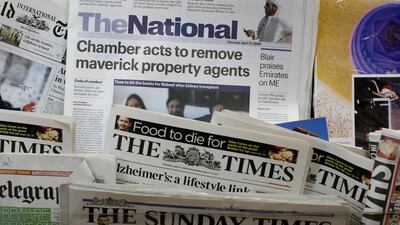In his latest film role, Tom Hanks plays Captain Jefferson Kyle Kidd, a veteran who travels through post-Civil War Texas, reading the news to a beleaguered and downtrodden population.
The film, News of the World, is highly watchable fare and, for me as a journalist, it also touches a soft spot for the idea that our work has for a long time been important to people in all countries and walks of life. More importantly, the film's story underlines the powerful ability of newspapers to connect with their readers in an emotive way.
More than 150 years on from the time that this compelling fiction is set, digital technology is in danger of severing that precious connection, as we come full circle from the first industrial revolution and the beginning of a golden age for newspapers in the early to mid-19th century.
A newspaper itself is an evolving, living concept, depending on time, place and purpose. Hanks’s character takes on the job almost of a reader’s editor, picking and choosing which articles to read from a number of publications he finds in locales along his route of travel through the Old West.
Captain Kidd has a knack for knowing precisely which tales will grip his audiences. These include human interest articles and stories of incidents in faraway places, as well as the more mundane and officious local announcements that impact their day-to-day lives.
People willingly hand their coins over to Captain Kidd to pay for this service. They are either too time-poor or too illiterate to read the news for themselves.
In an early scene, Hanks tells his gathered audience in Wichita Falls: "Now, I know how life is in these parts, working a trade sunup to sundown. No time for reading newspapers. Am I correct? Let me do that work for you. And maybe, just for tonight, we can escape our troubles, and hear of the great changes that are happening out there."
The realities of life and survival get in the way but that does not dim the people's thirst for knowing more about the world that they live in.
The cinematic portrayal of this appetite rings true. It has been tapped for thousands of years in one way or another. The first recognised newspaper, however, was printed in the early 17th century in Germany. Today, the World Association of News Publishers represents 18,000 publications in 120 countries. No matter the well-reported travails of the industry at the moment thanks to increasing levels of digitalisation in society and business, it is still very much alive.
Technology – from steam power to the telegraph to the television and the internet – has always been a feature of the industry, although until now, it was a tool to be wielded by the publisher in its delivery of the news direct to its audiences. Instead, the advent of digital platforms and smartphones has created a layer between the newspaper and its reader that is controlled by a separate, third party.
We could argue that the newsagent or newsstand used to be that third party but it was never an intrusive part of the relationship – only ever a facilitator, just a convenience. We cannot say the same for the likes of Facebook and Google.
However, I think back to Hanks and News of the World, and I ask myself how long such a profession as he portrays would have lasted. And I wonder if, by the start of the 20th century, some 30 years after the film was set, such a role would have become redundant.
Rising levels of education and wealth and higher rates of urbanisation in the US would have allowed far more people to pick up a newspaper more regularly. Modern roads and transportation networks meant that distribution channels allowed newspapers to reach more people directly in their homes and places of work.

The American mass-market newspaper was a feature of the early 1900s.
By the same calculation, I also look into the future and wonder if so many readers will still need digital middle men, such as Facebook and Google, to curate the news for them in the fashion that they do now – electronic versions of Captain Kidd.
At the moment, much of the debate around the future health of the news business is around the point at which newspapers and digital platforms meet. For example, Rupert Murdoch's News Corp has made a deal with Google that will mean the internet giant will pay for the content from its newspapers. This agreement is to some being seen as a watershed for how news is consumed online.
I would argue that it represents something else, which such a deal tacitly acknowledges: the beginning of a shift.

Currently, newspaper readers are as time-poor as they ever have been. Equally, levels of digital literacy in society are at a nascent stage, with people having only had the internet for a quarter of a century and smartphones for less than half that time.
At some point, people’s understanding and comfort with their digital experiences will catch up with the scale of our digital lives and we will all have the freedom and convenience of being able to directly pick up our news from whichever source we need, without the need for a digital Captain Kidd curating the experience for us.
Equally, advances in technology including payment systems will likely make it far easier for an individual to pick and choose his or her own news sources directly, thus re-establishing the precious, direct link between newspapers and a reader.
Ultimately, we may one day look back and think of platforms such as Facebook, offering us the news as curios, much like we might the concept of Captain Kidd today.
Mustafa Alrawi is an assistant editor-in-chief at The National


